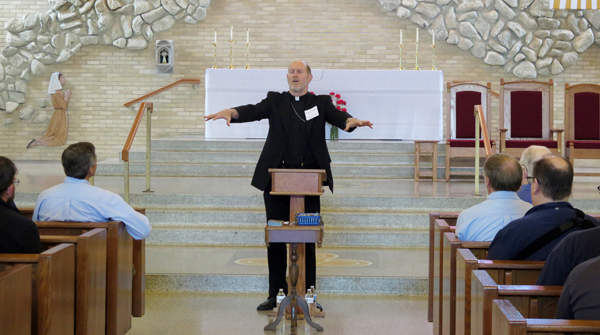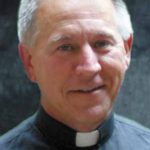
Bishop Thomas Zinkula stresses the seven heavenly virtues during a men’s conference on May 18 at Our Lady of Lourdes Church in Bettendorf. The event was sponsored by the Knights of Columbus.
By Anne Marie Amacher
The Catholic Messenger
BETTENDORF — The key to moving from a life based on self to a life based on others is to develop good habits, Bishop Thomas Zinkula said during a men’s conference May 18 at Our Lady of Lourdes Church. Begin with small acts of self-control. Develop human/moral virtues that are good habits,” the bishop told his audience of around 80 men from various parishes.
The bishop was one of three speakers at the conference that the parish’s Knights of Columbus council sponsored. Deacon Chris Kabat of St. Wenceslaus Parish in Iowa City addressed the issue of pornography. The third speaker, Michael Havercamp, director of evangelization and mission at St. Paul the Apostle Parish in Davenport, spoke on challenge and witness.
Grand Knight Gary Thennes said the parish’s KCs organized the men’s conference to inspire, give spirit to and encourage men to be faith filled. “Serving is key. We (Knights) serve our parish. There are plenty of Knights here,” he noted. Father Chris Weber, parochial vicar at Lourdes and a KC, opened the half-day event with prayer.
Bishop Zinkula commented that he was not used to seeing the front pews full, which drew laughter from his audience. He began his talk reflecting on the night sky and all the things that can be seen in that sky, good and bad. He identified seven heavenly virtues. The three theological virtues of faith, hope and charity “are the foundation of Christian moral activity. They give life to all the moral virtues.” The four cardinal virtues of prudence, fortitude, temperance and justice are natural virtues acquired by human effort, aided by God’s goodness, he said.
Then he named the seven capital/deadly sins of lust, gluttony, greed, sloth, anger, envy and pride, followed by the seven contrary virtues of chastity, temperance, charity, diligence, patience, kindness and humility.
We struggle between virtues and vices, Bishop Zinkula told the men. The more time, energy and attention spent on Adam I, the career-oriented, ambitious side of our nature, the less time, energy and attention we have to devote to the internal world of Adam II, which embodies moral qualities, the bishop said. “In our culture today, Adam I has taken the place of Adam II.”
Life in today’s world is loud, busy, crazy and fast-paced. Find space, time and quiet to hear God’s voice, he advised the men. Engage in personal prayer, the daily examen, receive the sacraments of Eucharist and reconciliation, and get involved in men’s groups.
Following a break, Deacon Kabat told the men, “We are all on a journey, a journey into eternal life. A journey to be saints.” He talked about the different ways in which pornography is viewed — from a secular perspective to the church perspective. He noted that St. John Paul II said, “Pornographic images reduce the person being lusted over to body parts only. There is not dignity when the human dimension is eliminated from the person.”
The battle to eliminate pornography “starts here in our hearts,” Deacon Kabat said. To arm, heal and overcome starts with each individual. “As men of faith we start with God. We love God because God loves us.” He told the men, “We have to arm ourselves with knowledge about this scourge.” But, “this is as much a spiritual battle as it is one of education and healing.”
He challenged the men with two questions. Do you know Jesus? Do you believe that Jesus loves you? The more severe the addiction to pornography, alcohol, drugs or even food, — the more difficult to overcome feelings of not being loved or even being capable of being loved. The addict finds “a way to fill that hole.” Deacon Kabat told the men about resources on the diocesan website to address this difficult issue.
In his talk, Havercamp said people struggle with virtue daily. “Jesus knows there is something deeper and more powerful than our thoughts. That’s why the very first thing he (Jesus) says in the Gospel of John is ‘what do you want?’”
Havercamp asked the men to think about what they spend their time doing, how they answer the call of power, pleasure, possession and honor. He compared power with politics, pleasure with pornography, possessions with pursuit of material things and honor with one’s reputation.
Addiction is a chronic disease of brain reward, motivation, memory and related circuitry. Breaking an addiction requires a return to the Lord, he said. It takes a recommitment to the Lord. Freedom and joy come from discipline. Don’t just add religious activities to your life. Embrace silence, too, he advised.
“We can only have one God. One. Know the god you’re serving. I am not ashamed of Jesus Christ. I stand here because of him.”
Havercamp encouraged his audience: “Men, you too, stand in that great tradition. You are the sons of the Father. You are called. You are anointed. You are sent. Now take up this mantle and lead.”











